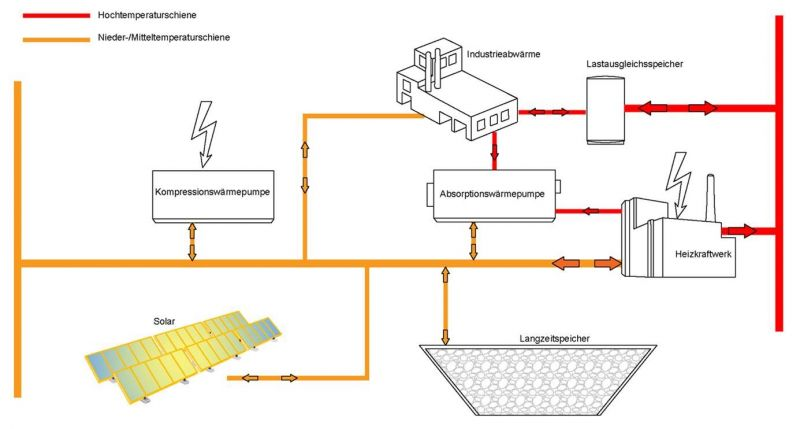Urban district heating extended – Development of flexible and decarbonized urban district heating systems
Short Description
Status
Completed
Starting point/Motivation
In 2016, 22 TWh/a, which corresponds to 7% of the total Austrian energy demand (311 TWh/a, including electricity, industry and transport) was covered by district heating. 28% (87 TWh/a) of this total energy demand was used for space heating in Austria, 23% (72 TWh/a) for thermal processes in industry. The achievement of medium and long-term international and national climate targets such as the Paris Climate Convention and Austria's Climate and Energy Strategy 2018 is a major challenge in which flexible and sustainable district heating systems play a central role. District heating allows for an efficient integration of renewables and storage facilities and offers considerable CO2 and cost reduction potentials in meeting the heat demand, especially in urban areas. Therefore, solution approaches for novel district heating concepts are essential.
Contents and objectives
In this project, innovative technical concepts for an extension of urban district heating supply systems were developed and evaluated. The objective was to enable a flexible district heating supply by integrating, among others, long-term heat storage, (large-scale) heat pumps and large-scale solar thermal plants and to significantly increase the share of renewable energy sources as well as the coverage from waste heat utilisation. Specifically, the added value that the three investigated components can represent is evaluated for three characteristic district heating supply areas of different sizes (Vienna, Klagenfurt, Mürzzuschlag) and with different generation portfolios.
Methods
The methods and simulation tools required for the analysis of the three district heating supply areas on component and system level were developed (e.g. in Dymola, TRNSYS) and validated. Based on the existing systems, different technical configurations (e.g. solar thermal + heat pump + long-term storage) and application sequences were simulated and evaluated, based on local, technical and economic conditions. The results and findings of the investigations were also evaluated with regard to their transferability to other urban district heating supply areas.
Results
The approach developed within the project, which a) is based on previous experience and expertise as a basic framework and b) is supplemented by the specific challenges arising from the questions posed by the project on the decarbonisation of district heating by the system solutions under consideration, has provided valuable insights into the technical and economic feasibility of the components investigated, both individually and in combination, for use in small to very large district heating systems in Austria. Furthermore, it has proven to be a good basis for further, comparable feasibility studies by the industrial partners and an important element of further research projects in this complex of topics. This approach was a two-step process to 1) evaluate the technical and economic feasibility of different concepts for the decarbonisation of different district heating systems and then b) clarify technical details. Furthermore, the findings and experiences of the research project form the basis for a critical examination of the question of a possible transferability of the methodology and the project results to other urban district heating supply areas. The results of the project are therefore relevant for energy supply and district heating operators as well as for planners and technical offices.
Prospects/Suggestions for future research
A replacement of fossil energy sources in the supply of energy and heat is urgently and promptly necessary to make our heat supply sustainable. District heating plays an important role here, as there is great potential to efficiently integrate renewable heat and thus supply buildings. This is also shown by the results and findings presented. However, there is a clear need for research, development and demonstration in the areas of a) improved know-how of the individual components, b) systemic integration and c) cooperation between planners, research and energy suppliers and dissemination of results in order to extend and test the project results and to enable further roll-out.
Project Partners
Project management
AEE – Institut für Nachhaltige Technologien (AEE INTEC)
Project or cooperation partners
- S.O.L.I.D. Gesellschaft für Solarinstallation und Design mbH
- Technische Universität Graz - Institut für Wärmetechnik
- Wien Energie GmbH
- STW Stadtwerke Klagenfurt AG
- Stadtwerke Mürzzuschlag Gesellschaft m.b.H.
Contact Address
Dr. Ingo Leusbrock
Feldgasse 19
A-8200 Gleisdorf
Tel.: +43 (3112) 5886-261
E-mail: i.leusbrock@aee.at
Web: www.aee-intec.at

